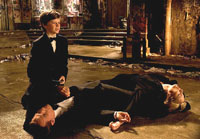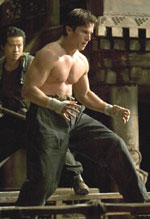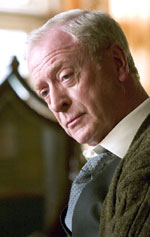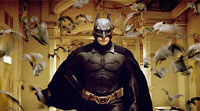 |
It was the best of times. It was the worst of times. This is the tale of two Batmans.
One Batman is DC Comics’ Dark Knight—a wealthy man so torn by grief, revenge, fear and anger that he chooses to build his empire not only above the streets of Gotham but also underground in a cave. He studies, he trains, and he builds himself into a superhero by pure resolve so he may do what others cannot: defend the defenseless and give hope to the hopeless.
The other Batman was born in the 1966 movie and TV show and showed up again in Batman Forever (1995) and Batman & Robin (1997). He’s the Kitsch Batman. These style-over-substance campy portrayals show just the basic outline of the real character—he’s a guy in a suit with lots of toys but none of the internal drama. But, hey, he has enough Bat Shark Repellent and bat nipples to spare.

The real difference between these two Batmans comes down to a seemingly simple question: Why does he do what he does? What really drove him to become the Caped Crusader who lurks in the night? Dissecting the issues involved in what pushes a man this far—compassion, fear, choice, anger, revenge and justice—makes Batman more than a campy caricature. Sadly, that question has rarely been asked in Batman movies. Thus, we don’t see who this guy is: a gritty and tough creature of the night who has as much going on in his head as with his fists. The only time we’ve really seen this Batman in film was in Tim Burton’s 1989 version when two crooks sat on a roof and told a ghost story of a man-bat who can’t be killed. But then, the Batman franchise slipped back into over-stylized visuals over story. The Dark Detective was gone.
Until now. There is a scene in Batman Begins where a group of thugs on a dock hear a noise. And then … one of them is gone. Vanished. The crooks realize they aren’t alone. They pull their guns—too late. Another one of them is gone. A shadow in the dark is hunting them. As they shake with fear, we know we’ve seen this before in horror films—but this time, we aren’t scared for the prey. We’re rooting for the crafty attacker who uses fear as a weapon against, not for, evil. He’s the boogieman for lowlifes. This is Batman.

Yes, the Dark Knight is back. But merely resurrecting a Batman true to the comics is not really the biggest success for Batman Begins. Instead, the film’s greatest achievement is in how fully it answers the question of why Gotham’s favorite son would take to the night to fight thugs. By showing us why he’s dark, why he chooses a bat costume, and why he chooses fear as his weapon, director Christopher Nolan pushes so deep into the person of Bruce Wayne (Christian Bale) that this bizarre character suddenly becomes real, understandable, and truly heroic. This is a gritty and smart personal drama more than an action film. And it is what a Batman film always should have been.
A natural storyteller, Nolan (Memento, Insomnia) begins Bruce Wayne’s journey by intersecting three key times important to Bruce’s destiny: The day his parents were killed, his return from Princeton for an important criminal hearing, and his training under a mentor (Liam Neeson) who sees great promise in the lost and searching young man. As these tales unfold, we see the birth of something new in Bruce Wayne. From a destitute, angry victim of evil, Bruce slowly and methodically finds himself and a purpose.
The key component to Batman’s development and emergence is fear—feeling it, confronting it, conquering it, and using it. During his training with Neeson’s mysterious Henri Ducard, Wayne learns to confront his fears and go a step further—use it to his advantage. “To conquer fear, you must become fear,” Ducard says. “You must bask in other men’s fear. You have to become a terrible thought.”

When Wayne leaves his training, he is no longer lost in fear and anger. He now believes that by being an example, maintaining integrity, and showing compassion, one man can help Gotham—a city he’d previously left to rot. However, he knows that as a flesh-and-blood man, he can only do so much. He needs to become that “terrible thought.” He needs to become a symbol of fear. But how? For the answer, Bruce only need look at his own nightmares. “Bats frighten me,” Bruce says to loyal butler and father figure Alfred (Michael Caine). “This time, my enemies will share my dread.”
From there, Bruce builds his Bat Cave, spray paints artillery armor black, and even grinds his own bat-shaped throwing stars. For a geek like myself, this preparation sequence is pure glee—we actually see a determined Bruce Wayne becoming Batman. But what makes this more than just a “Where’s Waldo” game of bat-toys coming together is that you learn a great deal about Batman’s character by his reasoning for even little things. Unlike Batman movies of the past, Nolan’s film concentrates on function over form. All of Bruce’s decisions have a purpose in telling his story—they don’t just look cool. For instance, the Batmobile is chosen because it was built for heavy fire and to jump large rivers (it even has GPS to navigate its landings). And the bat-cape—in contrast to the non-caped outfits in The Incredibles—is a necessary safety feature. Even Bruce’s playboy image and the people he surrounds himself with—his own Q (Morgan Freeman) and good cop James Gordon (Gary Oldman)—are carefully constructed tools in the birth of Batman.

Because of Nolan and co-writer David Goyer’s concentration on telling the story of how a guy could actually choose to become a costumed crime-fighter, and because they’re showing a real person, this is the best Batman film yet. In fact, it resets Warner’s Batman series back to square one by rewriting key story points and opening it to more than just die-hard Batman fans. Instead, it’s just a good, compelling story. The movie does lose a little steam when not squarely focused on Wayne’s growth—the final act, when the movie descends into pretty typical comic book action, is the film’s weakest. But that is probably only because it’s the only time the film feels at all conventional. Instead, the film by and large delivers with captivating writing, genuine surprises, deep emotion and sharp humor.
The smartest move in Batman Begins‘ production was to put the script in the hands of Oscar-winning actors and seasoned veterans. The cast is all around brilliant. There’s no Batman Forever-upstaging. Instead, each actor creates a fully-developed character to add to the whole. Bale is solid at the center of the movie—though he’s better at portraying the many dimensions of Bruce Wayne than at portraying Batman, who at times comes off a tad goofy. While all of the supporting actors could be praised, the most credit goes to Caine for providing the movie’s heart as Alfred.

Unlike Batman movies of the past, the villains don’t exist to steal the show. Instead, they propel the story. Crime boss Carmine Falcone (Tom Wilkinson) rules the streets with fear and unflinching resolve. Creepy Dr. Crane (Cillian Murphy) is scaring people batty with a secret toxin. And there’s a looming threat from the mysterious Ra’s Al Ghul (Ken Watanabe) who believes that, like overgrown trees, sometimes civilizations need to be trimmed by a pruning fire. Because of the Batman franchise’s history of clogging movies with too many movie-stealing villains with stupid schemes, this trio of terror worried me at first. But it turns out that it all adds up to a sinister plot that makes sense—sure, it is extreme, but it is no more than a terrorist plot conceived by some extremists who are convinced they are right.
Because of the weight of the story, there are some provoking questions raised in Batman Begins: What is the difference between revenge and justice? When does compassion become a weakness if your enemies don’t show it? What inspires people to rise above the standard? Why must all men fall? When is fear a good thing?
Another thought discussed in the film comes from assistant district attorney Rachel Dawes (Katie Homes), who tells Bruce, “It’s what you do that defines you.” Because of what director Nolan and crew has done with Batman Begins, they’ve rescued Batman for movie fans by truly profiling and defining Batman—as a man torn by revenge, fear, compassion and anger who uses his emotions and gifts to try doing good so that others may have an example to follow.
Talk About It
Discussion starters- What is the difference between revenge and justice? Which of the two is Batman pursuing? What makes it different than Ra’s Al Ghul’s plan?
- Can compassion be a weakness?
- What inspires people to rise above the standard? Is Batman’s example as inspiring as, say, Spider-Man’s is for New York City?
- A key line is “Why do all men fall? To learn to pick ourselves up.” What does this mean to you? What implications does it have in faith for a Christian?
- Rachel Dawes suggests that Bruce Wayne’s true face is that of Batman—not Bruce Wayne. What does this mean to you? Do you think that’s true based on the film? What determines who we really are?
The Family Corner
For parents to considerThe film is rated PG-13 for intense action violence, disturbing images and some thematic elements. Take the rating seriously when it comes to younger children. Besides some harsh street-fighting, martial arts, sword play and other comic book violence, the movie is also very dark. There are some genuine scary moments as Batman is hunting criminals and when drugged people are seeing frightening visions.
Photos © Copyright Warner Bros.
Copyright © 2005 Christianity Today. Click for reprint information.
What Other Critics Are Saying
compiled by Jeffrey Overstreetfrom Film Forum, 06/16/05When Tim Burton’s Batman and Batman Returns brought the Dark Knight to the big screen, he’d transformed the comic book hero and his various enemies into an entertaining freakshow. Burton didn’t seem terribly interested in plot; he was preoccupied with creating excuses for the Bat, the Cat, the Joker, and the Penguin to flaunt outrageous costumes and even more outrageous egos. But that wasn’t so bad compared to the embarrassing and kitschy Joel Schumaker-helmed editions, Batman Forever and Batman & Robin.
All the while, comic book fans dreamed of a more serious Batman film, one along the lines of the favorite comic book narrative by Frank Miller known as Batman: Year One.
In Christopher Nolan’s hard-hitting, all-business, fast-paced Batman Begins, bat-fans get their wish. It’s a terrific movie featuring excellent performances from first-rate cast—Liam Neeson (better than he’s been in years), Morgan Freeman, Michael Caine, Tom Wilkinson (so greasy, he’d scare Morgan Spurlock), and Gary Oldman. And Christian Bale, a fine actor below Hollywood’s big-name radar, is more convincing, interesting, and compelling as Bruce Wayne and Batman than Clooney, Kilmer, or Keaton ever were. And Katie Holmes does just what’s required of her as our hero’s childhood sweetheart.
Nolan’s film is also the most rigorously plotted, psychologically complex, and intellectually challenging of the lot. Like the recent Star Wars episode, its mythic conventions lend themselves to political interpretation. And it concludes with a bold move that tells us Nolan and his co-writer, David Goyer of the Blade movies, are disregarding the previous Batman films, fully intending to recreate Gotham’s famous fiends according to their own specifications. Most fans will be thrilled and satisfied, and the movie is likely to be one of the summer’s most successful blockbusters.
Best of all, Nolan seems intensely interested in the ethical dilemmas that would face a man like Bruce Wayne, tempted to carry out personal vendettas, desiring to defend a city from terrorists and psychopaths, unable to heal the deep wounds of his childhood, eager to indulge his anger. In fact, the story of Batman’s rise is in many ways similar to the story of the fall of Anakin Skywalker.
My full review is at Looking Closer.
Peter T. Chattaway, who also writes reviews for Christianity Today Movies, writes in his personal blog, “Batman Begins allows us to start anew. And what a promising start it is. This movie really is all about Bruce Wayne … The villains may loom large, as any suitably menacing or threatening villain does, but ultimately they are only accessories to his story. And because the film deals with them in series, rather than in parallel, we never get the feeling that the villains are bunching up and crowding Batman out of the picture.”
Steven D. Greydanus (Decent Films) raves, “It’s tempting to call Batman Begins the Citizen Kane of super-hero movies. … Oh yes, it’s one of the very best … the most sophisticated, nuanced, mature super-hero movie to date, and the most masterful, in-depth origin story ever filmed. Above all, Batman Begins succeeds where the earlier run of Batman films … failed: It creates a compelling, complex personality behind the cowl, a hero who is more than a figurehead in his own film, overshadowed by colorful adversaries. At last, the Dark Knight has a soul.”
Lisa Rice (Crosswalk) says the film is “clever and fun, and the special effects throughout the movie just might win an Oscar. The star-studded cast is amazing, and the talents of the new Batman, Christian Bale, are commendable. There is only one profanity in the movie, and no sex, but the violence and scariness are over the top in some places … The tone is quite dark, so hopefully parents will exercise discernment about the cognitive development levels of their own children as it relates to their ability to deal with bats, monsters, insane bad guys, and the crime in a dark and gritty city.”
Bob Smithouser (Plugged In) says the movie “does a masterful job of making Bruce Wayne a more sympathetic hero without violating the legend. He still lingers in shadow. He still growls hoarsely, ‘I’m Batman.’ However, we no longer see him as just an unfortunate boy who witnessed the senseless murder of his wealthy parents. With the gaps filled in, we now understand the fear and guilt that haunted him, and how even his thirst for revenge became frustrated before he got his moral bearings … [Bale] has the presence, dry wit and smoldering intensity to make Bruce Wayne believable.”
Mainstream movie critics are mostly positive about it, the majority preferring Nolan’s caped crusader to Tim Burton’s costumed freak.
from Film Forum, 06/23/05More Christian reviewers have lined up to praise it, making director Christopher Nolan’s film one of the most highly praised films of 2005 so far.
Frequent Christianity Today Movies contributor Peter T. Chattaway (Canadian Christianity) says, “Batman Begins is easily the best of the summer blockbusters so far, and quite possibly the best movie ever made about the Dark Knight. … [It] brilliantly affirms the truth that justice is something more than mere vengeance, and that good and evil tug for control of the hearts of every person. This is the first Batman movie that just might encourage some genuine moral reflection. Let’s hope the inevitable sequels can keep up the good work.”
David DiCerto (Catholic News Service) says, “Some viewers may feel that the movie’s overall tenor is too bleak. But portraying Batman as a tormented and tragic figure is true to the tone of creator Bob Kane’s original vision. … What separates Batman from other superheroes—and what the movie conveys—is that his mystique taps into our fears and sense of helplessness. [Batman’s] enduring appeal is that of a noble idea: that one man can make a difference and be a force for good in the world.”
Josh Hurst (Reveal) is thrilled. “Nolan’s first time in the Bat-chair is a movie so artfully crafted, a story so masterfully told that it’s easy to forget that it’s a comic book movie. Ten minutes into the film, one can’t help but feel sorry for all those involved in the Burton and Schumacher films. … This is the work of a skilled, confident filmmaker who truly understands the Batman story. This is Batman.”
Michael Elliott (Movie Parables) raves, “By taking us back to the origins of the ‘Bat,’ Nolan not only breaths life back into the comic book world of Bruce Wayne and his alter-ego, he has given us one of the best super-hero films ever made.”
Daniel Revill (Relevant) writes that the movie “should have no trouble laying claim to the title of best superhero film (and one of the year’s best).”
Kevin Miller (The Joy of Movies) echoes the enthusiasm, saying it’s “the first truly great superhero film. While most superhero films tend to emphasize spectacle over story, Batman Begins is more like a character study masquerading as an action movie.”
At Hollywood Jesus, others blog away about the film. Maurice Broaddus says Nolan “emphasizes character and story over special effects and nipples on the bat-suit, creating an adult drama from what my grandmother used to refer to as ‘funny books.’ And I couldn’t be happier.” Mike Furches says, “It has the best car, the best story, the best Alfred, the best villains, the best story, the best effects, and the best Batman.” And Johann Snyder finds it “a surprisingly insightful film.”
“Batman Begins blew me away from start to finish,” says Jonathan Rodriguez (Christian Spotlight), “and kept me glued to my seat for its almost two-and-a-half hour running time.”
from Film Forum, 06/30/05Andrew Coffin (World) writes, “The film cleverly succeeds in explaining the practical aspects of the bat-man, gamely, as did the recent Spider-Man films, showing the hero sometimes unsuccessfully growing into his new role. Batman Begins is somewhat less successful in explaining the psychology of Wayne/Batman.”
Mike Parnell (Ethics Daily) raves, “It is not just good; it is great. There is nothing wrong with this film. It treats the source with love and care, which is good news for those who’ve spent years collecting the comics and learning the smallest facts about a character. Batman Begins delivers in every way.”
from Film Forum, 07/14/05Michael Leary (The Matthew’s House Project) writes, “As what is slated to be the first of a few Batman films seemingly determined to rescue the franchise from the slapstick excesses of previous attempts, its fierce pacing whets audience appetites for more. Christian Bale’s perfect performance deserves a few sequels as his brooding Batman far outstrips Keaton’s roguish charm, Kilmer’s bland affectations, and Clooney’s inability to nail the part. Bale reminds us of how serious and thought provoking a comic hero can really be.”
A ready-to-download Movie Discussion Guide related to this movie is available at ChristianityTodayMoviesStore.com.













